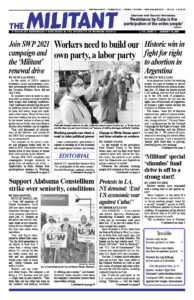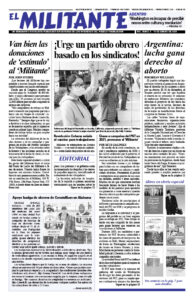In an important victory for working people, the right of women to choose to have an abortion was won in Argentina Dec. 30, when the Senate passed a bill making abortion free and legal up to the 14th week of pregnancy. As senators debated the bill into the night, tens of thousands of supporters of women’s rights rallied outside the Congress in Buenos Aires.
The streets “were full of feminist organizations, political organizations, unions and lots of independent and very young activists,” Victoria Tesoriero, a spokesperson for the National Campaign for the Right to Legal, Safe and Free Abortion, told the Militant by email Jan. 4. “We waited all night, some of us watching the debate others were just dancing. I had a wonderful ‘murga’ girls band near us playing. Everything was very exciting.”
Simultaneously, pro-choice vigils were organized in many other cities nationwide. “Because of the COVID-19 pandemic many activists couldn’t come to the National Congress,” said Tesoriero, so they organized actions in their local areas. “Our movement is present in every province of Argentina, from Jujuy to Tierra del Fuego. We are very proud of that.” For years, increasingly large and broad protests have taken place across Argentina, where abortion was banned in most cases. Under this pressure, Argentine President Alberto Fernández introduced a bill to legalize the procedure last November.
It was passed by the lower house, the Chamber of Deputies, Dec. 11 in a 131-117 vote. The Senate then voted 38-29 in favor. In 2018 a similar bill had gone down to defeat in the Senate.
‘We built a national campaign’
“We built a national campaign full of activists, with clear goals,” said Tesoriero, “and a complete slogan — ‘Sexual education to decide, contraception to not need an abortion, legal abortion to not die’ — with a clear strategy: to mobilize in the streets for legal abortion.
“I think that in the history of this struggle,” she said, “the Campaign, an alliance of more than 600 organizations, has the credit for expanding the demand of legal abortion, taking it from the feminist groups to other organizations.”
There were also large mobilizations by opponents of the legislation across the country, including actions organized by the Catholic and evangelical churches and other organizations.
The previous law only allowed an abortion when a pregnancy resulted from rape or endangered the life or health of the woman. In all other circumstances having an abortion was punishable by up to 15 years in jail.
This meant only women in the ruling class and upper middle classes could afford to end an unwanted pregnancy by going to costly doctors in the major cities illegally, or traveling outside the country. Working-class women and those living in rural areas were forced to turn to clandestine and illegal abortions.
Some 40,000 women each year showed up at Argentine hospitals seeking care after botched procedures. This had been the chief cause of maternal death in the country.
“The law that we won to legalize abortion was more than simple ‘decriminalization,’” Nicole Aranovich, a high school teacher who joined the protest Dec. 29 by City Hall in Mar del Plata, told the Militant by email. “With simple ‘decriminalization’ of abortion, the state wouldn’t assume any responsibility of guaranteeing a safe and equal practice throughout the country.”
This bill, she said, gives all women “the right to interrupt their pregnancy until week 14, so the state is in charge of guaranteeing that everyone may fulfill that right if they wish to.” Because Argentina’s health care system is government funded, the procedure will be free.
In the vast majority of countries in Latin America women’s right to choose abortion is severely restricted. In some, including El Salvador, the Dominican Republic, Haiti, Honduras, Nicaragua and Suriname, the procedure is banned in nearly all circumstances.
“I am sure this victory will impact other countries in Latin America,” said Tesoriero. “The national campaign for legal abortion, and our symbol, the green bandana, has gone around the world. And it has had an impact in the region with women in many countries launching their own campaigns. We are unstoppable!”
Only in Cuba, where workers and peasants made a revolution, and in Uruguay, Guyana and in Mexico City and the Mexican state of Oaxaca — and now Argentina — can women freely choose to have an abortion today.


